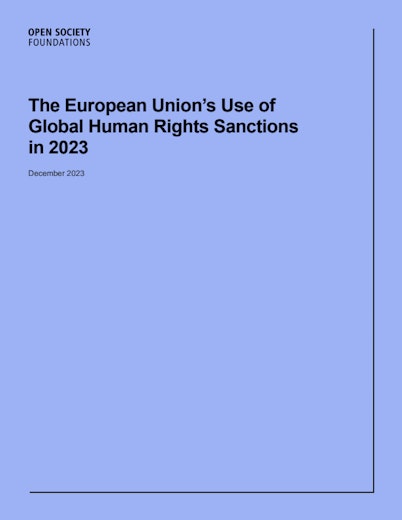December 2023 will mark three years since the EU adopted the Global Human Rights Sanctions Regime. While the EU has used different types of sanctions for over 30 years, the EU’s Global Human Rights Sanctions Regime increases its power to hold crooked businessmen, politicians, and law enforcement officials accountable for human rights violations, particularly those suffered by girls and women, including one of the most egregious abuses—sexual and gender-based violence used as a weapon of war.
The European Union’s Use of Global Human Rights Sanctions in 2023, a new report from Open Society–Europe and Central Asia, provides a one-year review of how the sanctions have worked. While the report highlights successes, it also provides recommendations about how the sanctions can strengthen cooperation between the EU and civil society, increase the use of sanctions when women and girls are victims, and help develop an anticorruption framework to address corruption globally.
Download
-
The European Union’s Use of Global Human Rights Sanctions in 2023 (215.19 Kb pdf file)
Download the 11-page report.
Read more
Voices In Depth
Ukraine’s Everyday Resistance

In the four years since Russia’s full-scale invasion, Ukrainians have sparked a civic reawakening. From frontline towns to major cities, ordinary people are defending democracy, caring for one another, and laying the groundwork for a post-war future.
Racial Discrimination
A Community Rallies Against Racial Discrimination in Denmark

When Denmark’s housing policies used racial discrimination to upend their community, local residents looked to the law to fight back. Now their six-year legal challenge is before the European Union’s top court in Luxembourg.
Evidence for Accountability
Q&A: How Open Source Evidence Is Challenging Abuses, Atrocities, and Disinformation

Bellingcat has pioneered the use of open-source research to expose human rights abuses, atrocity crimes, and high-level corruption and other criminal activities involving governments, gangs, and other illicit actors.
